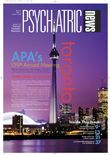With anticipated publication of DSM-V now only five years away, APA's 2006 annual meeting will feature numerous sessions that will highlight scientific, clinical, and methodological issues being explored to improve diagnosis, according to Darrel Regier, M.D., M.P.H, director of APA's Division of Research and executive director of the American Psychiatric Institute for Research and Education (APIRE).
“Since the publication of DSM-IV in 1994, there has been extraordinary progress in research in so many areas—brain circuitry, genetics, family studies, and new data analysis techniques—that could potentially help us to make unprecedented leaps in the way we diagnose our patients,” Regier noted.
APIRE has an NIH-funded, five-year research planning conference grant designed to engage work groups representing the global research community in recommending what research needs to be conducted to incorporate these scientific leaps into a diagnostic reality. Titled “The Future of Psychiatric Diagnosis: Refining the Research Agenda,” the project comprises 12 research work groups, 10 focused on specific diagnostic topics and two on methodologic issues. At the annual meeting, four of these work groups will review their recommendations and describe research now under way to implement them.
At noon on Monday, May 22, Regier will chair the forum “Research Planning for the DSM-V,” which will provide an overview of the progress to date on this dynamic project.
“The research planning work groups, which consist of expert scientists and clinicians throughout the world from various disciplines, were challenged to focus their collective knowledge on three questions: What are the strengths and weaknesses of the current DSM criteria? What research findings currently exist that might justify changes in criteria? And what research needs to be done that could be tested within the next couple of years to make the classification more valid and useful?,” explained William Narrow, M.D., M.P.H., associate director for diagnosis and classification in the Division of Research and a co-principal investigator with Regier for the conference grant.
Beyond stimulating the field to conduct needed research, the recommendations generated through the conferences will serve as resources for future DSM-V work groups and, at the discretion of the WHO leadership, for the pending ICD-11 revision.
In addition to the forum, four symposia will review in greater detail evidence arising from conferences on personality disorders, substance use disorders, stress-induced and fear circuitry disorders, and dementia. All of these symposia will take place on Tuesday, May 23, at 2 p.m.
A principal focus of the work group on personality disorders has been to examine the scientific rationale and prospects for integrating alternative dimensional models into currently used categorical approaches to the diagnosis of personality disorders. The symposium will be chaired by John Livesley, Ph.D., and co-chaired by Thomas Widiger, Ph.D., who also co-chaired the research planning conference on personality disorders.
“Substance Use Disorders: Planning a Research Agenda for DSM-V” will highlight research opportunities that could facilitate evidence for changes in substance use disorder definitions and criteria: Should dependence criteria be tailored to specific substances? How might a research focus on withdrawal help validate orthogonal concepts of dependence and abuse? Presentations will review these and other research priorities generated from this research planning group's efforts. Marc Schuckit, M.D., and Bridget Grant, Ph.D., will co-chair the symposium.
Dennis Charney, M.D., dean for research at Mt. Sinai School of Medicine, will lead the symposium “Stress-Induced and Fear Circuitry Disorders.” The research planning work group on this topic questioned whether future research on selected current anxiety disorder classifications could be improved or changed by building from brain-based phenotypes. The presentation will review highlights of state-of the-science findings, including neural mechanisms of fear and anxiety, the role of cognitions, neural circuitry, and neurochemistry/neuroendocrinology.
The symposium “Diagnostic Criteria in Alzheimer's Disease and Dementia,” chaired by NIH's Trey Sunderland, M.D., will highlight the work group's recommendations for exploiting recent scientific breakthroughs in a fast-moving field. Presentations will address how diagnostic criteria might be updated to reflect data emerging from novel applications of neuroimaging technologies, how improved assessment of executive function and attention can contribute to a better understanding of the pathology of the dementias, and how prospects for clinically applicable biomarkers in prognosis and diagnosis of Alzheimer's disease and dementia.
The research planning conference series, which APIRE administers with the cosponsorship of WHO and NIH, is nearly halfway complete, with five of the 12 conferences already conducted. Future conferences will focus on psychotic disorders, the spectrum of obsessive-compulsive behavior, somatic presentations of mental disorders, externalizing disorders of childhood, depression and generalized anxiety disorders, and the clinical, forensic, economic, and other implications of a revised classification from a public health perspective. Another conference will assess the overall practicality and utility of incorporating dimensional approaches into the DSM.
Each conference is being co-chaired by a senior U.S. investigator and an international colleague, and psychiatrists and others from around the world are being invited to participate.
“The extent of international interest in the DSM-V research-planning conferences is very encouraging,” Regier said.“ Because the manual is used throughout the world, we are making a strenuous effort to ensure that DSM-V empirically considers the different ways in which individuals experience mental disorders across cultures, socioeconomic status, and across the globe.
“Members should be aware that a Web site is available at<www.dsm5.org> that provides information about the future conferences and detailed summaries of those that have already taken place. We will use the site to report new developments as they occur over the next several years and to offer researchers and the general public opportunities to offer feedback and suggestions regarding DSM development.”
He noted that Michael First, M.D., who is a consultant to APIRE and has played a major role in prior revisions of the DSM, led the creation of the Web site. ▪
